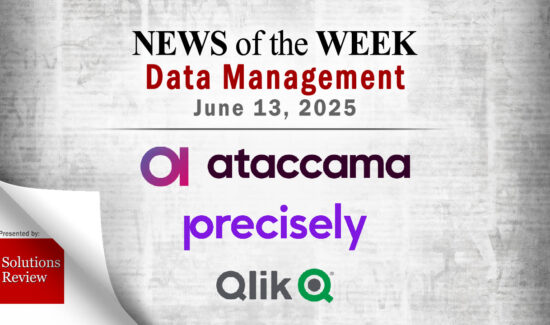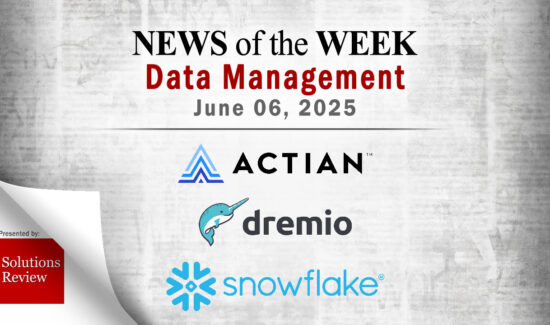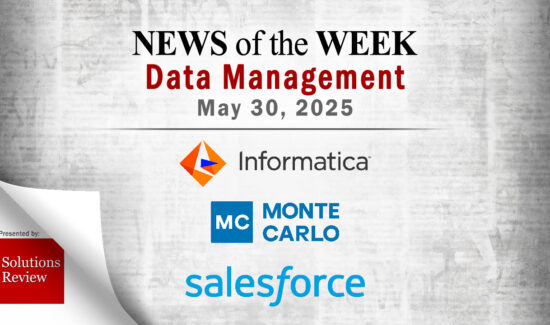CRN Big Data 100: 10 Data Management Tools We Recommend


IT news and analysis outlet CRN recently released its sixth annual 2018 Big Data 100, a vendor listing that identifies the solution providers that are innovating in the space. The list is aimed at helping the providers identify the best partners. Different this year is that the list is broken down into four distinct technology categories, including business analytics, data science and machine learning, big data systems, and data management and integration tools.
CRN has gone ahead and published the 45 ‘coolest’ data management and data integration providers included in the list via an interactive slideshow. At Solutions Review, we track the solution providers that have the biggest impact on the enterprise. As such, we’ve read through CRN’s complete rankings, available here, and plucked the 7 data management tools we think matter most. For an even deeper breakdown of the top data management solutions, consult our Buyer’s Guide for Data Management Platforms.
1010data is based in New York and provides integrated capabilities for database management and data analytics. The company’s flagship product, Insights Platform, also features data modeling and visualization, reporting, and application development. 1010 brings disparate data together to provide a granular view, and the solution scales to any size. In addition, the tool’s columnar data storage capabilities present data in an orderly fashion. 1010data has raised $35 million in venture capital since its founding in 2000.
Bedrock Data is a Boston-based data management solution provider that offers its capabilities via two main product lines. The first, Bedrock Data Fusion, allows organizations to automate data pipelines across SaaS applications. Bedrock Data’s Sync provides users the ability to keep data aligned across applications without coding or development. Sync features more than 50 pre-built connectors and automatically syncs every five minutes. The company was founded in 2012.
MarkLogic offers an operational and transactional enterprise NoSQL database that is designed to integrate, store, manage, and search for data. Organizations can ingest structured and unstructured data with a flexible data model that adapts to changing data. It also natively stores JSON, XML, text, and geospatial data. MarkLogic’s Universal Index enables users to search across all data, and APIs enable application development and deployment. The database has ACID transactions, scalability and elasticity, and certified security as well.
MemSQL is headquartered in San Francisco and offers a real-time data warehouse that ingests data continuously to perform analytics. The tool can ingest and transform millions of events per day while also analyzing billions of rows of data using standard SQL. MemSQL can be deployed on-prem, in the cloud via Amazon Web Services or Microsoft Azure, or as a service including drop-in compatibility with existing middleware, integration, and BI software. MemSQL is available in two editions: Developer (not for product deployments) and Enterprise.
Podium offers an enterprise-class managed Data Lake in short order and includes a full set of essential management features to ensure organization, transparency, governance and security. Podium’s development environment is fast and easy to use, requires no specialized Hadoop skills and is easily adaptable to evolving business needs. The provider claims that deployment of a secure, managed enterprise Data Lake takes less than a week.
Qubole’s flagship data management product is its Autonomous Data Platform, a solution that self-manages and self-optimizes by sending alerts and Insights and Recommendations (AIR) based on cloud agents connected to the customer’s data policies and preferences. Qubole uses a combination of heuristics and machine learning for workload continuity as well. The company is headquartered in Santa Clara, California. Since its inception in 2011, Qubole has raised $75 million in venture capital.
StreamSets provides what it has dubbed ‘the industry’s only DataOps platform’ that allows organizations to build, execute, operate and protect data movement architectures. The platform combines open source Data Collector capabilities with Control Hub, a cloud-native tool that helps users manage data movement. The company was founded by Informatica’s former Chief of Product Girish Pancha. Stream Sets is based in San Francisco.
Tamr offers an enterprise-scale data unification product that uses machine learning to prepare and bring together data across silos. Its core solutions feature procurement and sourcing analytics, customer data integration, and data mastering. The company was recently named to Gartner’s new Market Guide for Data Preparation, a report means to cover new and emerging software markets. Based in Boston, Massachusetts, Tamr was founded in 2012 by three database industry veterans.
Waterline Data offers a data cataloging solution that uses machine learning to discover and manage enterprise data. The tool allows organizations to automatically and incrementally “fingerprint” data and infer its lineage by analyzing data values for relational, cloud, and Hadoop data. The company was founded in 2013 by Alex Gorelik. Waterline Data is based in Mountain View, California.
Zaloni is a Durham, North Carolina-based data lake management capabilities provider. The company’s flagship product is the Zaloni Data Management Platform (ZDP). The solution operationalizes data along the entire pipeline, from data source to consumer. ZDP automates repeatable data management tasks and processes, and provides central management of all enterprise data sources whether on-prem, cloud, multi-cloud, or hybrid. Zaloni is compatible with all major Hadoop distributions, most data processing engines, and applicable deployment models.
See the full CRN Big Data 100.
Widget not in any sidebars




















